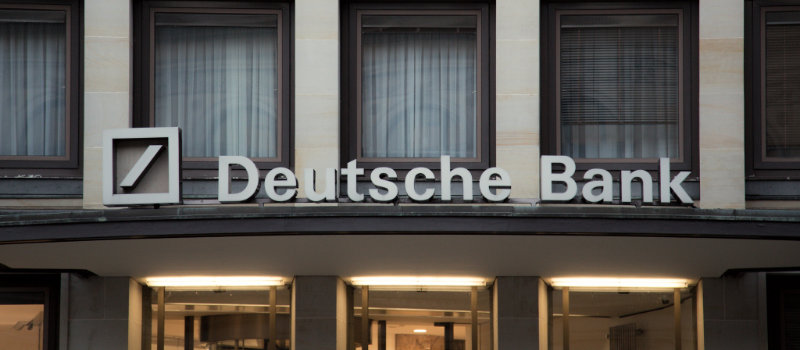Deutsche Bank faces FBI investigation
June 22, 2019 | Expert Insights

BACKGROUND
Deutsche Bank has struggled to bounce back after the 2008 financial crisis and has been plagued by failed regulatory stress tests, multi-billion dollar fines and management upheavals and most recently a failed merger. The lender, Germany's largest, has been making progress in working its way through litigation over past years, but was recently again in the headlines due to lapses in safeguards to identify money laundering.
Deutsche Bank was the only mainstream financial institution willing to lend Trump money after a series of high-profile bankruptcies and defaults in the 1990s. The bank lent him more than $2 billion over the last two decades. On the day he took office, Trump’s approximately $364 million in active loans with Deutsche, was the largest debt listed in the new president’s financial disclosure forms.
Deutsche provided Trump with millions in loans to build the crown jewel of his hotel chain, the Trump International Hotel in Washington, located a few blocks from the White House. As a president, his massive debt to Deutsche created an equally massive conflict of interest. The bank was already under investigation by the Justice Department for an alleged $10-billion scheme to launder money out of Russia.
ANALYSIS
Reports say that the Deutsche Bank is under federal investigation for failing to comply with regulations meant to stop money laundering. The investigation includes a review of Deutsche Bank’s handling of so-called suspicious activity reports that its employee prepared about possibly problematic transactions, including some linked to President Trump’s son-in-law and senior adviser Jared Kushner.
Former Deutsche Bank anti-money laundering specialist, Tammy McFadden, told The New York Times that she had recommended that the bank alert the Treasury Department to a series of money transfers from the Kushner Cos. to Russian individuals in 2016, but the bank decided against it. McFadden’s lawyer, Brian McCafferty, told the Times in a story published that he was recently contacted by the FBI about his client.
Kushner Cos. released a statement saying “any allegations regarding Deutsche Bank’s relationship with Kushner Companies which involved money laundering is completely made up and totally false.” Kerrie McHugh, a Deutsche Bank spokeswoman, declined to comment on the specifics of the investigation but reiterated that the bank “remains committed to cooperating with authorized investigations.”
The investigation started as an inquiry into the bank’s role in helping Russian money launderers but has since grown in scope. One element is the bank’s possible role in a vast money laundering scandal at the Danish lender Danske Bank. The Justice Department has been investigating Deutsche Bank since 2015, when agents were examining its role in laundering billions of dollars for wealthy Russians through a scheme known as mirror trading. Customers would use the bank to convert Russian rubles into dollars and euros via a complicated series of stock trades in Europe and the United States.
In response to news of the FBI investigation, the watchdog group Citizens for Responsibility and Ethics in Washington have asked that the Federal Reserve Board open an investigation into whether Deutsche was complying with anti-money-laundering laws; and requested that the results of the probe are made public. The New York Attorney General’s office is also scrutinizing Trump’s ties to Deutsche Bank. Earlier this year, AG Letitia James sent subpoenas to Deutsche related to three large loans the bank had given to Trump’s company.
Rep. Adam Schiff (D-CA), the new chair of the Intelligence committee, and Rep. Maxine Waters (D-CA), the new chair of the Financial Services committee, said they planned to jointly investigate Deutsche Bank. “The concern about Deutsche Bank is that they have a history of laundering Russian money,” Schiff said last December. “And this, apparently, was the one bank that was willing to do business with the Trump Organization.”
Trump has vehemently fought to block Deutsche Bank and other banks connected to him or his family from handing over documents to Congress, suing Deutsche to prevent it from cooperating with the intelligence and financial service committees’ investigations. In late May, a federal judge ruled that Deutsche and Capital One, another Trump lender, could provide the subpoenaed documents to Congress. Trump’s lawyers have said they will take their case all the way to the Supreme Court if necessary.
ASSESSMENT
Our assessment is that once potentially suspicious transactions are flagged in any financial institution (FI), it must be followed up meticulously by the institution. Further, after an alert is investigated and the financial institution verifies that suspicious activities are confirmed, a Suspicious Activity Report (SAR) must be filed. It is likely that the failure to do either or both can have serious consequences. It can be investigated whether there were wilful violations of the Bank Secrecy Act (BSA), including the Anti-Money Laundering (AML) program requirements and SAR reporting requirements, which if intentional, could be a criminal offence. If the violation is not wilful, it would be classified as a civil violation and this could lead to millions in fines and penalties. We believe that the Federal Bank Secrecy Act requires Financial institutions to alert the government if they suspect that the transactions involve criminal proceeds or are being used for illegal purposes.
We feel that if whistle-blowers like Tammy McFadden are correct, the bank has spent many years deliberately ignoring illegal behaviour by its clients in order to maintain high-profile relationships. We feel that if a client is regulating a bank that he does business with, that in itself would constitute a pure financial conflict of interest.








Comments